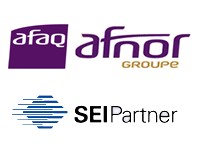Protecting the environment & conserving natural resources has become a global priority among businesses because environmentally conscious organization & customers prefer to do business with like-minded partners. Demonstrating that your company cares about the environment gives your company an edge over the competitors delivers value and improves your company’s image, which in turn increases revenues.
Purpose of ISO 14001
Management of environmental issues for an organization considering the interested parties concern is the main challenge of the business besides the reducing the direct & indirect impact on environment. Achieving environmental performance with improvement is demanded by the regulatory bodies, customers and other stack holders due to increased concerned along with environmental compliance.
Certification to ISO 14001 demonstrates your company’s commitment to caring for environment and provides a framework for an organization to manage its legal compliance and improve environmental performance, including risk and opportunity identification, analysis, target setting, and measurement. It also delivers significant cost benefits in terms of increased efficiency, conserving resources and waste minimization.
Benefits of ISO 14001
Certification to ISO 14001 demonstrates to customers & society your organization’s responsibility towards environmental friendly business practices with minimize or no impact on the environment. The main key benefits are:
- High level structure
- Introducing Lifecycle perspective
- Accountability of Top Management
- Provide & enhanced customer confidence and satisfaction, which in turn can lead to increased business opportunities.
- Facilitate reductions in pollution, waste, energy, injuries, and incidents.
- Better meet environmental legal compliance and corporate requirements.
- Provide a tool for environmental performance improvement and the means to effectively monitor and measure environmental performance.
- Provide a well-defined and clear framework, which is also flexible to your own business needs and expectations.
- A significant competitive advantage because customer companies require management system certification from suppliers and sub-contractors in order to conduct business with them.
More about ISO 14001
A certificate issued by third party registrar to demonstrates that your business system has been certified against requirements of ISO 14001 requirements. Implementation of ISO 14001 by setting up of internal processes gives confidence to customers & other interested parties about the managing environmental issues with minimum impact on the same.
ISO 14001 is an international standard for environmental management, applicable to companies of all sizes and types; certification to ISO 14001 provides a dynamic mechanism for the development of effective environmental management. Based on the Plan-Do-Check-Act cycle, ISO 14001: 2015 specifies the most important requirements to identify, control and monitor the environmental aspects of any organization, and also how to manage and improve the whole system.
Features of ISO 14001
ISO 14001 is based on two concepts one is continual improvement & regulatory compliance. It lays forth a best practice for proactive management of the environmental impact of your organization and may be combined with certification to other management system standards, e.g. ISO 9001 and OHSAS 18001.
ISO 14001 audits covers following:
- Policy statement (commitment of top management to improve environment)
- Assessment of aspects & its impact on the environment (evaluation of interaction with the environment that how much we are damaging the environment))
- Legal & other requirements (ensuring compliance to the law of the land)
- Documented objectives & targets (continual improvement)
- Resources, Role, Responsibility & Authority (making responsible every one)
- Competence, awareness & training (ensures availability of right person)
- Communication (with Internal & external interested parties)
- Documentation, Control of documents & records (for ensuring compliance)
- Operational controls(established working conditions)
- Emergency preparedness & response (check your preparation if any harm to environment)
- Performance measurement & monitoring (ensuring environmental parameters)
- Nonconformity, corrective & preventive action (provides mechanism for improvement)
- Management review (ensuring organization system is complied)
Continual environmental improvement through ISO 14001
Environmental aspects and its impacts are identified by a team of experts and setting of objective to reduce its significance by giving priority to achieve these through a frame work of management programs which identify the resources & approach to achieve the desired goal. Timely review of achieved objective & new process area will direct the organization to set the next goal towards improvement.
Certification Process for ISO 14001
DQS Certification India appoints a competent & suitable auditor or team of auditors to audit the organization against the standard & scope requested by the clients. Client has to file an application seeking standard for which to be certified. Gap analysis may be performed first to check readiness for the auditee organization which help organization to improve upon. Routine surveillance audits are carried out to evaluate continual improvement in the validity period. A re certification audit is performed after every three years to maintain continuity of the certification.


